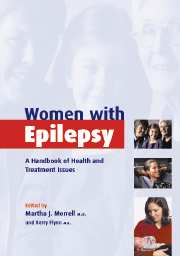Book contents
- Frontmatter
- Contents
- List of contributors
- Part I The woman with epilepsy
- Part II Epilepsy diagnosis and treatment
- Part III Hormones and the brain
- 10 Brain differences
- 11 Sex hormones and how they act in the brain: a primer on the molecular mechanisms of action of sex steroid hormones
- 12 Epilepsy and the menstrual cycle
- 13 Menopause and epilepsy
- Part IV Health challenges for women with epilepsy
- Part V Family planning, pregnancy, and parenting
- Part VI Living well with epilepsy
- Appendix: The Epilepsy Foundation's Campaign for Women's Health: bringing help and hope to women with epilepsy
- Index
- References
13 - Menopause and epilepsy
from Part III - Hormones and the brain
Published online by Cambridge University Press: 02 November 2009
- Frontmatter
- Contents
- List of contributors
- Part I The woman with epilepsy
- Part II Epilepsy diagnosis and treatment
- Part III Hormones and the brain
- 10 Brain differences
- 11 Sex hormones and how they act in the brain: a primer on the molecular mechanisms of action of sex steroid hormones
- 12 Epilepsy and the menstrual cycle
- 13 Menopause and epilepsy
- Part IV Health challenges for women with epilepsy
- Part V Family planning, pregnancy, and parenting
- Part VI Living well with epilepsy
- Appendix: The Epilepsy Foundation's Campaign for Women's Health: bringing help and hope to women with epilepsy
- Index
- References
Summary
A woman today is likely to spend half her life after menopause. Because many types of epilepsy are life-long, this means that many women with epilepsy can expect their epilepsy treatment to continue through the menopausal years. It is surprising, therefore, that there is so little information about how menopause affects seizure control. Of particular concern is whether hormone replacement therapy might affect seizures.
Fortunately, all this is about to change. A small group of dedicated physicians is conducting research into epilepsy after menopause. One group of these researchers has provided this chapter. Dr Krumholz is Professor of Neurology at the University of Maryland and Director of the Epilepsy Center there. He is very involved in the Epilepsy Foundation, both as a former member of the National Board of Directors and on the board of his local Epilepsy Foundation affiliate. Dr Abbasi is also an epilepsy specialist trained at the University of Maryland and is now working at the Neurological Center in Gastonia, North Carolina. Although we cannot provide all the answers to questions about epilepsy after menopause, at least we are finally asking the questions.
MJMIntroduction
Menopause (the phase of a woman's life when the ovaries cease to function and menstruation stops) marks the end of a woman's natural ability to bear children. Generally occurring between the ages of 48 and 55 years, menopause is recognized as an increasingly vital and critical part of a modern woman's life.
Keywords
- Type
- Chapter
- Information
- Women with EpilepsyA Handbook of Health and Treatment Issues, pp. 131 - 142Publisher: Cambridge University PressPrint publication year: 2003
References
- 1
- Cited by

